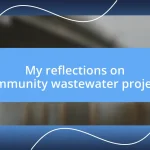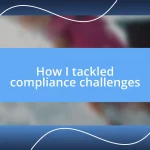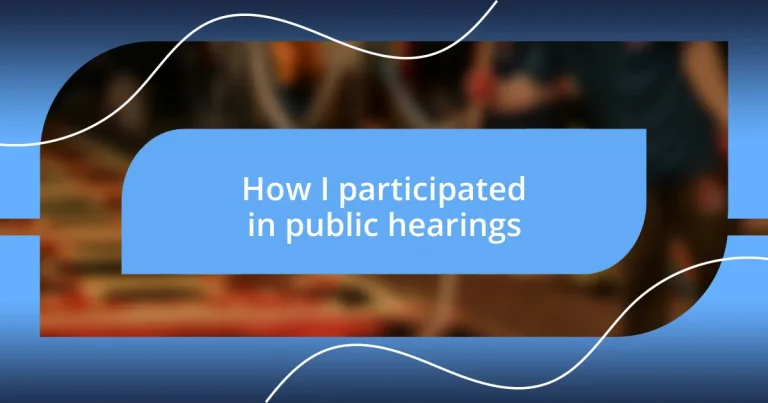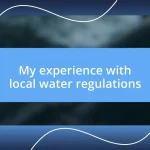Key takeaways:
- Participating in public hearings empowers citizens to voice concerns and advocate for change; every contribution, regardless of size, can make a difference.
- Effective preparation, including thorough research and rehearsal, enhances confidence and clarity in delivering impactful statements during hearings.
- Following up after hearings can strengthen connections with officials and encourage ongoing community engagement, amplifying the impact of individual voices.
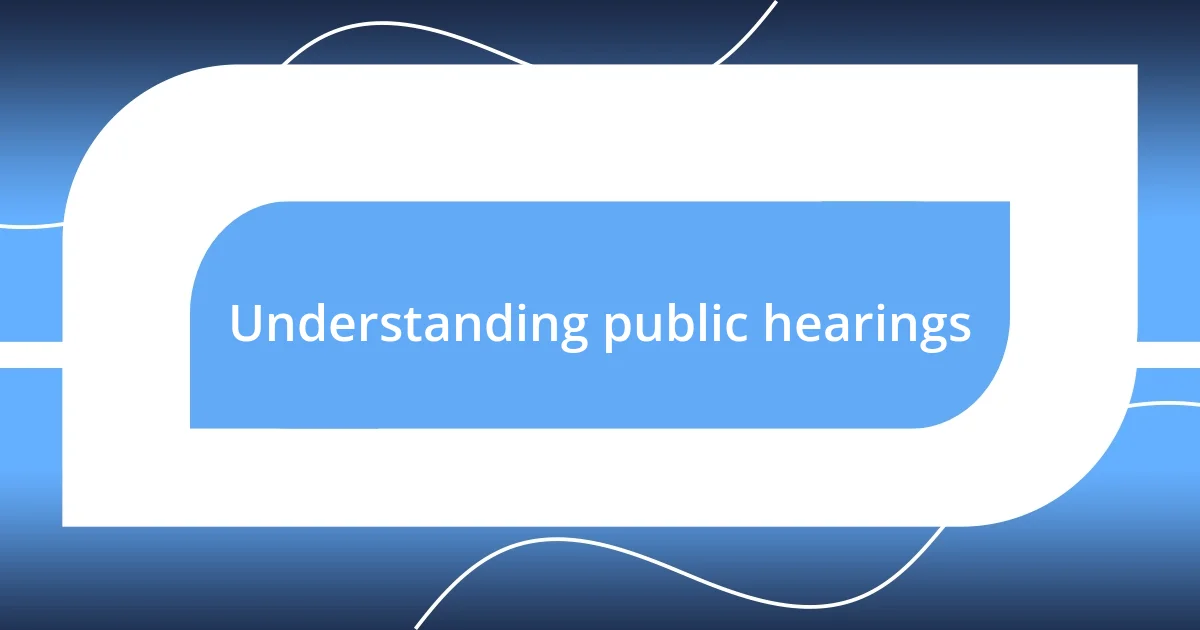
Understanding public hearings
Public hearings serve as a vital means for citizens to engage with decision-making processes that affect their communities. I remember my first experience attending one, feeling a mix of excitement and trepidation. What struck me most was the diversity of voices and opinions that filled the room, each person bringing their unique perspectives to the table.
These gatherings are not just formalities; they offer an invaluable opportunity to share concerns and propose changes. I recall listening to a powerful story shared by a local resident, whose passion inspired me to think about how I could contribute. Isn’t it fascinating how a single story can resonate with so many, sparking deeper discussions and reflections?
Understanding the significance of public hearings goes beyond mere participation; it’s about recognizing the power of collective advocacy. For those hesitating to speak, I once wondered if my voice would matter. That day, I learned that every contribution—no matter how small—can be a catalyst for change. How about you? What impact do you think your voice could have in shaping community decisions?
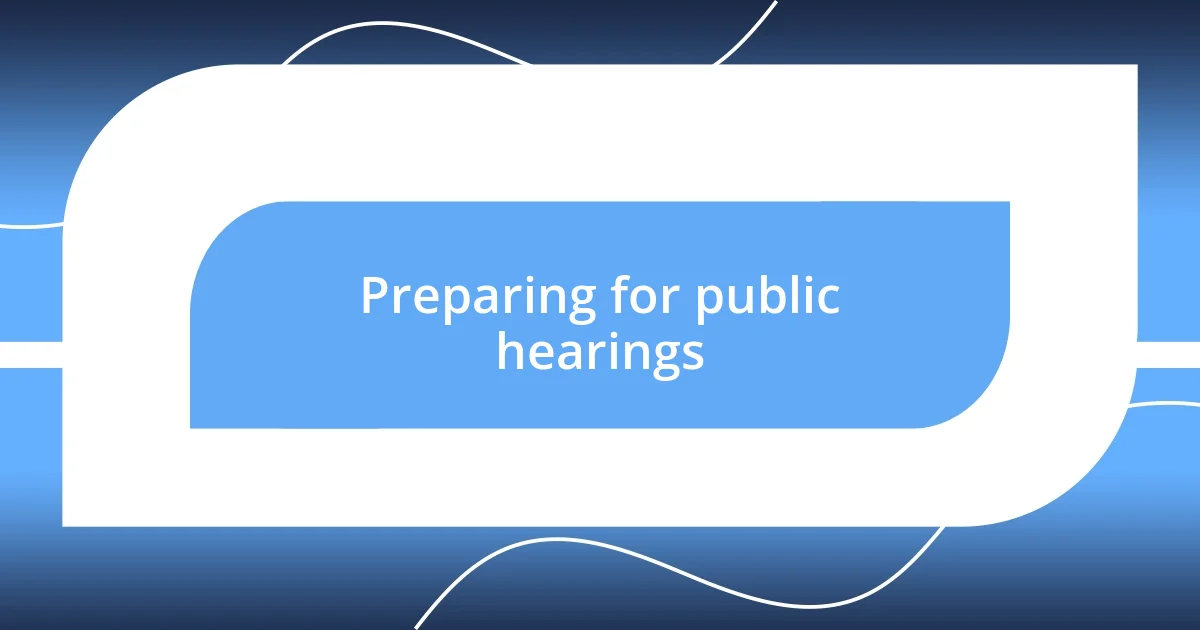
Preparing for public hearings
Preparing for public hearings requires a thoughtful approach to ensure that you’re both well-informed and confident when it’s your turn to speak. I always start by researching the topic at hand, diving into the agenda and any relevant documents. This preparation helps me feel grounded and equipped with the necessary background information, so I can participate meaningfully. When I attended my first hearing about local zoning changes, I spent hours reviewing community feedback and expert opinions. It made all the difference in how I articulated my thoughts during the session.
Another crucial aspect of preparation is practicing what you intend to say. I remember jotting down key points for my speech and running them by a friend for feedback. This simple act of rehearsing not only calmed my nerves but also allowed me to refine my arguments, making them clear and impactful. It’s incredible how a bit of practice can transform that initial anxiety into a confident presentation. Have you ever tried rehearsing in front of a mirror? I found it surprisingly helpful!
Lastly, I always remind myself to arrive early on the day of the hearing. It gives me the chance to absorb the atmosphere and get comfortable with my surroundings. I distinctly recall feeling the energy in the room build as more people arrived, each with their reasons for being there. That anticipation is palpable and adds to the importance of the moment. Wouldn’t you agree that being present and engaged well before you speak can shift your entire experience?
| Preparation Steps | Personal Insights |
|---|---|
| Research the topic | Feeling grounded with the right information makes a huge difference. |
| Practice your speech | Rehearsing helps calm nerves and refine arguments. |
| Arrive early | Absorbing the atmosphere builds anticipation and connection. |
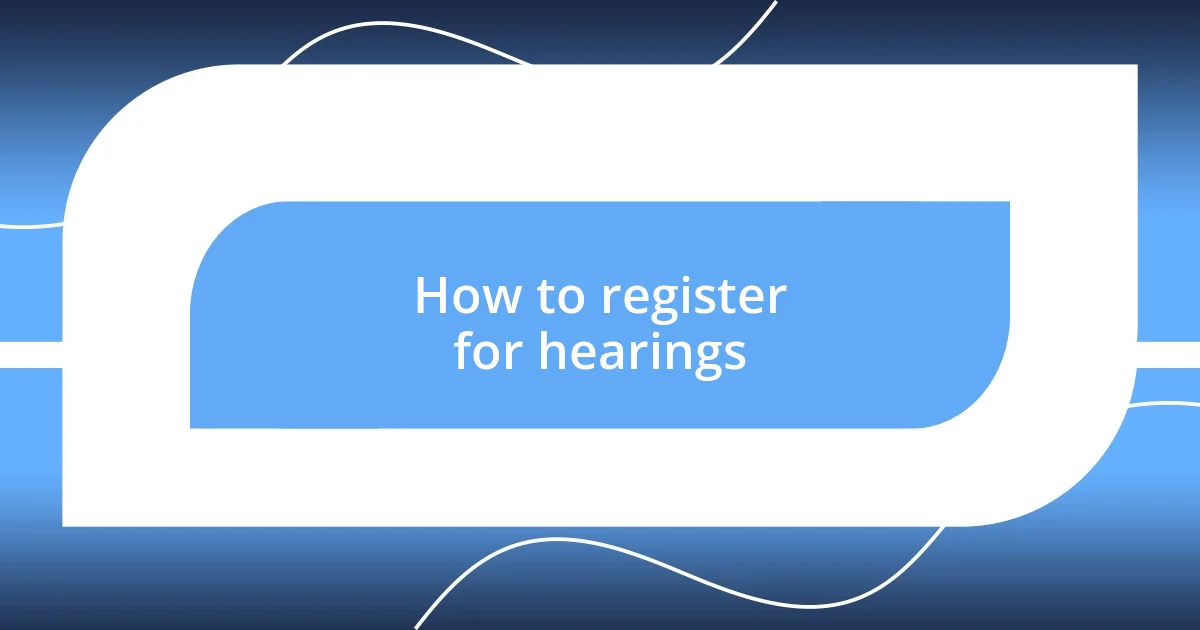
How to register for hearings
When it comes to registering for public hearings, the process can vary depending on the local government or organization hosting the event. My experience has shown that understanding the requirements early on is essential. I recall the first time I wanted to voice my concerns about a proposed development project. I had to navigate the registration process carefully to ensure that I didn’t miss out on the opportunity to speak.
Here’s how you can typically register for a public hearing:
- Check the official website: Most municipalities or organizations will have detailed information about the hearing, including registration deadlines and procedures.
- Contact local offices: If you’re unsure about the online information, don’t hesitate to call or email the relevant department. I remember reaching out to a local council office, and their guidance was invaluable.
- Prepare your information: Be ready to provide your name, contact details, and any specific issues or points you wish to address. I found that jotting down my main points beforehand helped in articulating my thoughts better.
- Follow up: After registering, keep an eye on any updates regarding the hearing. Sometimes last-minute changes can happen, and it’s good to stay informed.
I’ve learned that being proactive in the registration process can alleviate a lot of stress when the day of the hearing approaches. It makes me feel more connected and ensures that my voice will be heard alongside others in the community.
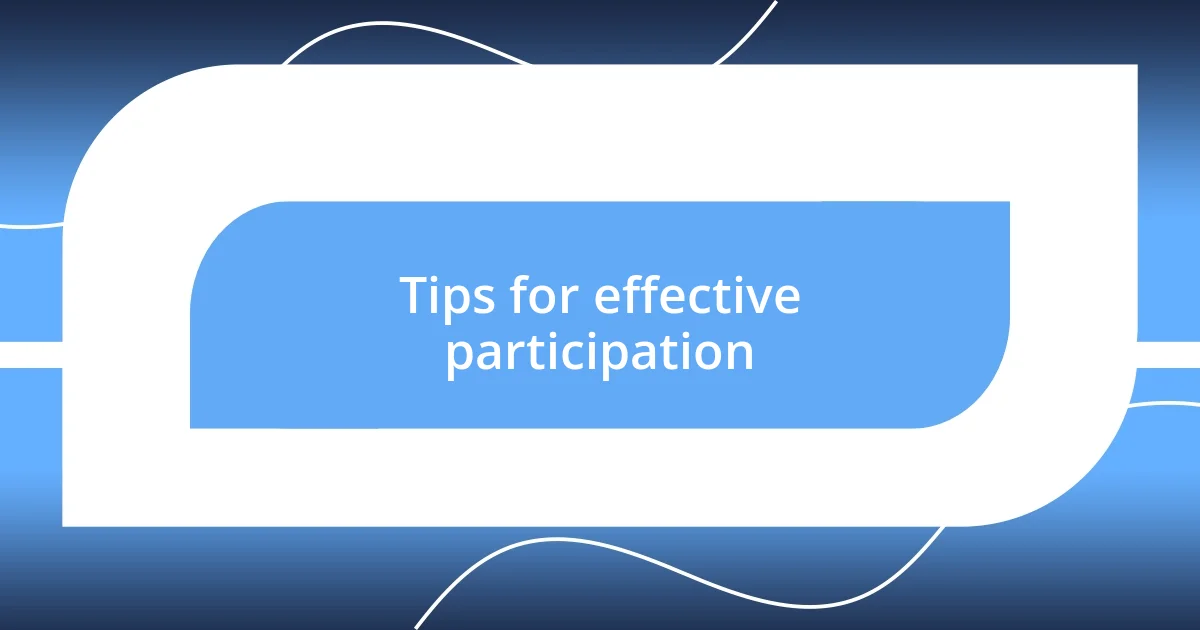
Tips for effective participation
Being clear and concise in your message is fundamental when participating in public hearings. I’ve found that speaking in a structured way—starting with a brief introduction, then diving into my main points—makes it easier for the audience and officials to follow my argument. Have you ever noticed how a well-organized presentation can captivate an audience? It really does make a difference.
Engaging with the audience is also vital. I always try to make eye contact and gauge their reactions while I speak. There was a moment during a session on environmental policies when I noticed nods of agreement from my neighbors. That connection empowered me to share a more passionate insight, and it felt as though we were part of a larger conversation. Don’t underestimate the power of non-verbal communication!
Lastly, be prepared for questions or feedback after your presentation. I recall a particularly challenging hearing where someone asked me to clarify my position on a complex issue. Instead of feeling defensive, I took a deep breath and offered an honest response. Embracing dialogue not only shows that you’re open to discussion but also enhances your credibility. Have you thought about how responding thoughtfully can strengthen your stance? It truly can turn a seemingly intimidating experience into an opportunity for deeper engagement.
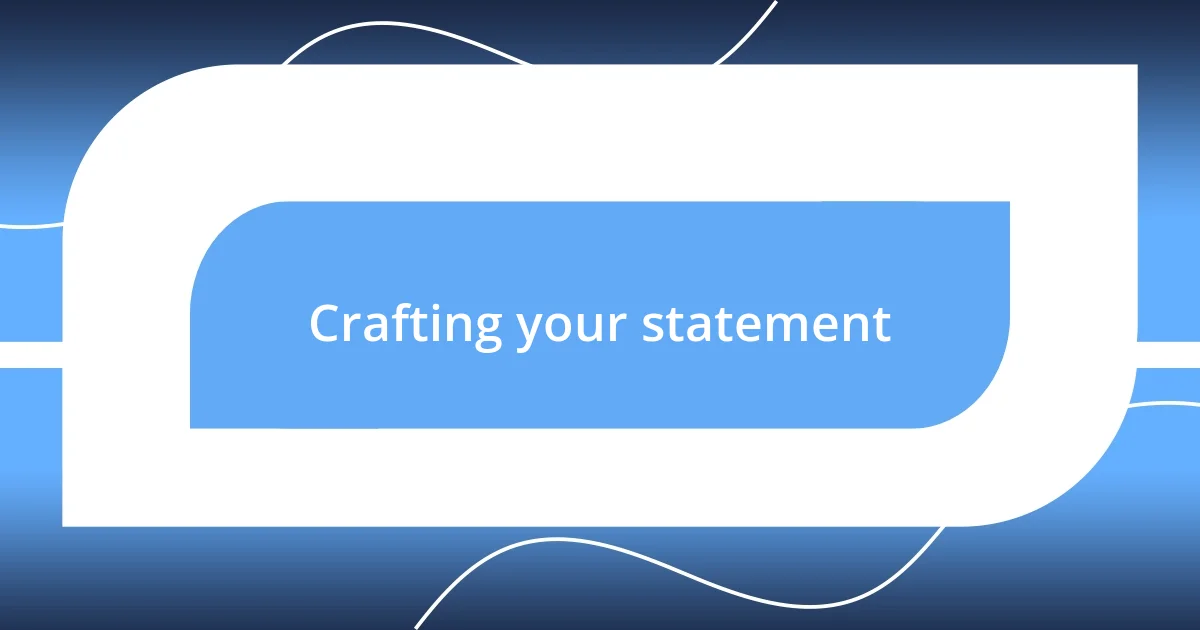
Crafting your statement
Crafting your statement is a crucial step in participating in public hearings. I always begin by identifying the key message I want to convey. Once, while preparing for a hearing on local zoning laws, I spent time condensing my thoughts into a single, impactful statement. The clearer I was about my main point, the more confident I felt when it was time to speak.
As I put pen to paper, I try to weave in both facts and personal experiences. I remember sharing a story about how the potential changes would affect my community park. By personalizing my message, I connected with the audience on an emotional level. Have you ever thought about how sharing a personal story can make your argument more relatable? It certainly worked for me!
Finally, I practice my delivery several times before the hearing. During one preparation session, I caught myself rambling and losing focus—it was a real eye-opener. I learned that rehearsing not only sharpens my message but also helps me gauge the timing, ensuring I’m concise. Isn’t it reassuring to know that a little preparation can make a big difference? When I finally stood up to speak, I felt ready and energized.
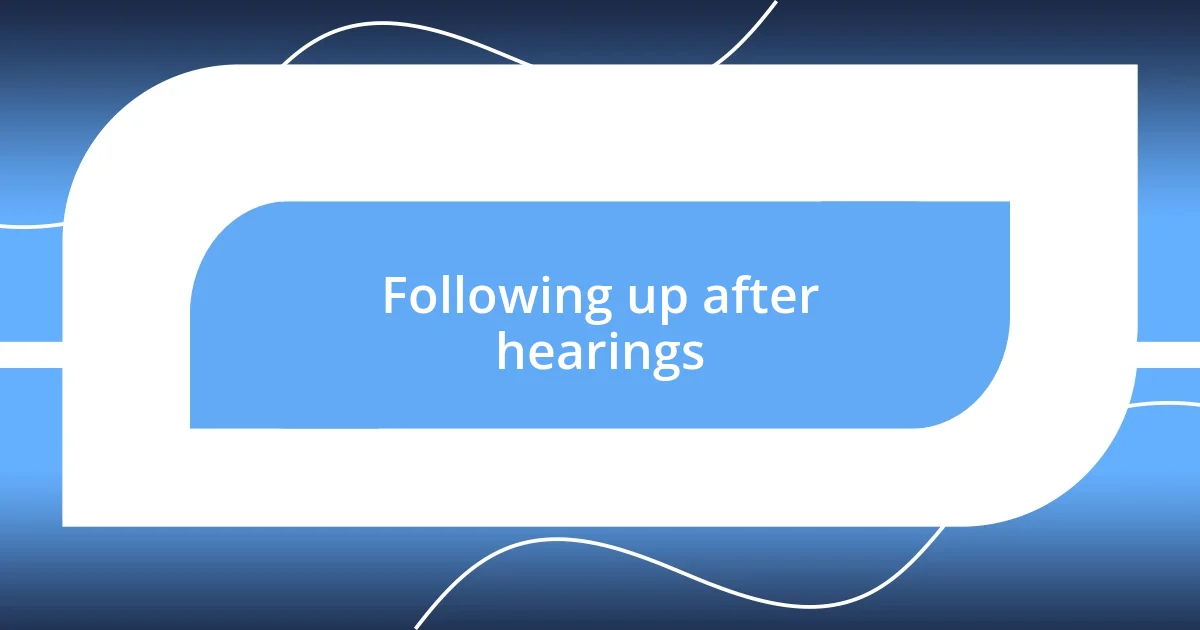
Following up after hearings
Following up after a hearing is just as important as preparing for it. After I participated in a recent public hearing on community development, I took the time to gather my thoughts and reflect on the feedback I received. I jotted down notes on what resonated with the audience and my own emotions during my speech. This reflection not only helped me process the experience but also gave me valuable insights for future hearings. How often do we stop to think about our own responses after sharing our opinions?
Reaching out to officials post-hearing can also be a game-changer. I remember sending a follow-up email to a city council member, thanking them for their time and reiterating my key points. To my surprise, they replied and even invited me to share my thoughts in a future committee meeting! This showed me how a simple gesture of appreciation could open new doors for engagement. Have you considered how nurturing connections can amplify your voice in these discussions?
Lastly, sharing your experience on social media or community forums is a great way to keep the conversation alive. I often post about my participation, not just to document it but to encourage others to speak up. There’s something fulfilling about knowing that my efforts might inspire someone else to take part in public discourse. Have you thought about the impact of your story on your community? It can be a powerful motivator for collective action.
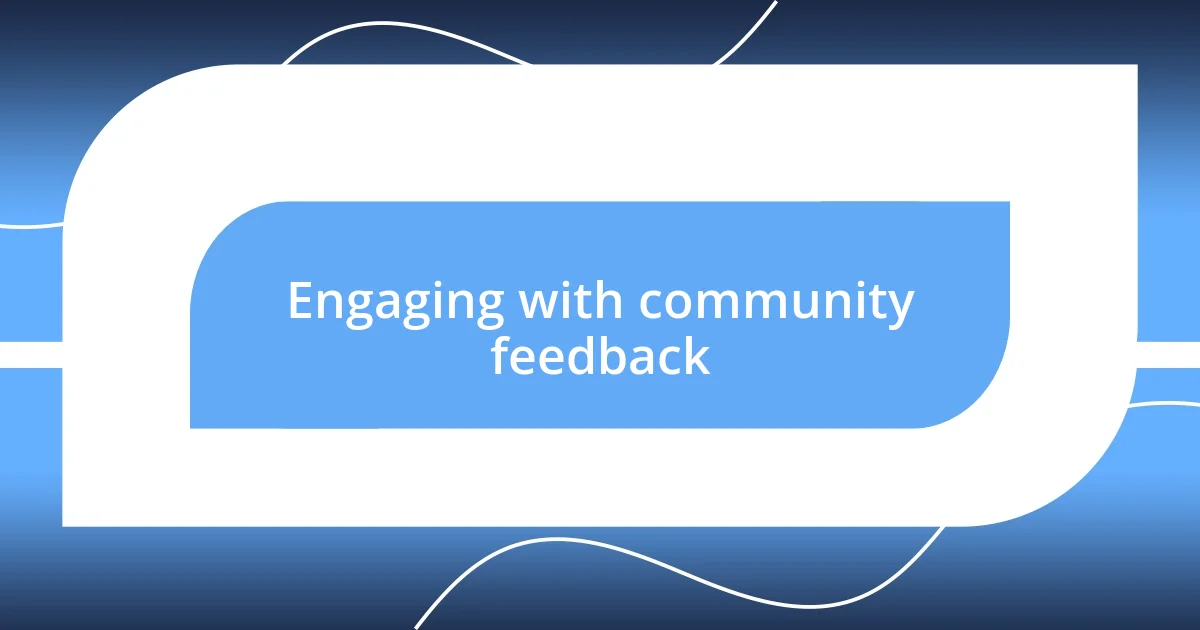
Engaging with community feedback
Engaging with community feedback transforms the public hearing experience. I’ll never forget attending a hearing on environmental policies where community members shared their thoughts passionately. One person raised a concern about the impact of a proposed development on local wildlife. This made me realize how critical it is to listen—not just hear—what others are saying. Have you ever had an experience where community voices sparked new ideas for you?
When I actively seek feedback during these sessions, I feel a deeper connection to the community. After one public hearing, I initiated a discussion with my neighbors to gather their opinions. I was amazed at how different perspectives came together to enrich our conversation. Isn’t it fascinating to see how our diverse backgrounds can shape the issues we care about? It reminds me that every voice truly has value.
Involving the audience can amplify engagement as well. Once, I asked an audience member to share their experience, making an already charged atmosphere feel even more electric. When we give space for others to voice their thoughts, I find it creates a genuine dialogue rather than a monologue. How often do we consider that engaging others brings out new insights? It was a powerful moment that showed me the beauty of collaboration in community discussions.


